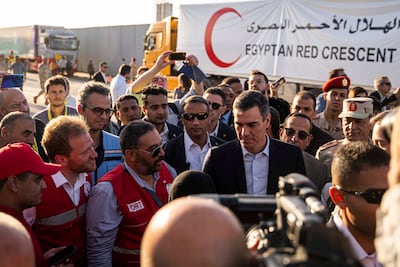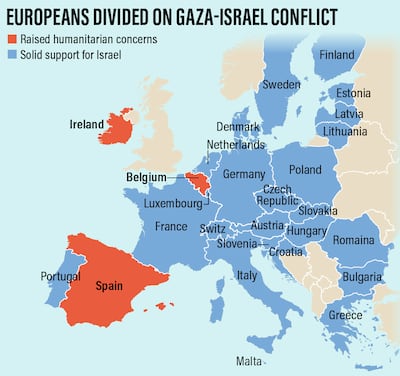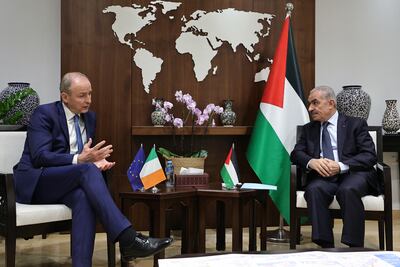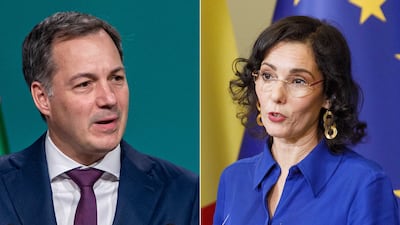Stopping the killing of civilians in the Israel-Gaza conflict “should be a priority for everyone”, Belgian Prime Minister Alexander de Croo said on Friday as the war looms over Belgium’s move into the rotating six-month European Council Presidency after Spain in January.
A Flemish liberal politician, Mr de Croo’s commitment to calling for a de-escalation of the conflict has not been endorsed by all EU members, many of whom have preferred to skirt around the sensitive topic and highlight Israel’s right to self-defence.
“I've been quite straightforward on that,” said Mr de Croo in a joint press conference in Brussels with Foreign Affairs Minister Hadja Lahbib to unveil their country's priorities as the incoming presidency.
“I'm more of a human being than a politician, and I think humanity is important.”
Yet this positioning will have to be “restrained” from now on, Ms Lahbib said, as Belgium endorses the role of an “honest broker” in often tough negotiations between the bloc’s 27 member states.
She spoke of Belgium's famed sense of compromise, often put forward by politicians as a natural consequence of their country’s complicated multilingual federal system.
Belgium’s negotiation skills will be in high demand in the coming months as the Middle East conflict brings back to surface tensions between the bloc's member states and Israel, an ally.
Statements made by Mr de Croo and his Spanish counterpart Pedro Sanchez during a visit to the region last month started a diplomatic row with Israel that led to accusations of support for Hamas, which is listed as a terrorist organisation by the EU. Spain and Belgium have rejected such accusations.

Mr de Croo said that he hoped that “no one was angry” if Belgium asks “to stop the killing of innocent civilians” and believes that a ceasefire is needed for humanitarian access to Gaza and to free the remaining 136 hostages held by Hamas in the enclave.
Another exception to overall European hesitancy to take a strong position on the conflict has been Ireland, which early on criticised Commission President Ursula von der Leyen for her apparent pro-Israeli bias.

In Germany, the October 7 attacks have spurred politicians to call for the recognition of the state of Israel's “right to exist” to become a prerequisite for citizenship candidates. Across the continent, antisemitic and anti-Muslim attacks have surged, prompting a senior EU official to say this week that the threat of a terrorist attack during the Christmas holidays was “huge”.
Irish President Michael D Higgins said that Ms von der Leyen did not speak for Ireland when she visited Israel one week after the Hamas attacks and said that she believed Israel would respond in a way that shows “that it is a democracy”.

In Belgium, observers said, there is particular concern to remain attentive to concerns expressed by all sides. But even more important perhaps to Belgian politicians are the looming European and Belgian elections next year which include local elections in which foreigners are allowed to vote.
Belgium hosts a Moroccan community which is more sensitive to the Israel-Palestine conflict, as well as a Jewish presence in the country’s second biggest city, Antwerp.
Brussels, which hosts EU institutions as well as Nato headquarters in nearby suburb, also boasts being the most cosmopolitan city in the world after New York.
“It’s a topic that preoccupies and interests everybody. I think I have never assisted at such a quiet meeting during which everybody listens to what others have to say on the Near East,” Ms Lahbib said.
The war in Ukraine also remains a pressing issue, as EU leaders ready to discuss next week Ukraine's membership bid to join the bloc. Ukrainian leaders have expressed fears that Russia's invasion of their country has been eclipsed by the war in Gaza.
“If we look at the atrocities human beings inflict on each other, we can only be in a situation where we know we have a responsibility to […] plead for the respect of human rights,” Mr de Croo said in his opening speech.
This week, Ms Lahbib was one of the few EU politicians to publicly support UN Secretary General Antonio Guterres’ letter to the Security Council invoking Article 99 of the UN charter. In an unprecedented move aimed at highlighting the gravity of the situation, Mr Guterres said that the Gaza conflict could threaten international peace and security.
Speaking in a personal capacity, the EU’s senior diplomat, Spanish politician Josep Borrell, asked EU members of the Security Council and “like-minded partners” to support Mr Guterres’ call to “prevent a full collapse of the humanitarian situation in Gaza”.
Previous statements by Mr Guterres on the conflict, including about the Hamas attacks not happening “in a vacuum”, have led to Israeli calls for his resignation.
The topic remains highly sensitive, and EU politicians have been hesitant to echo Mr Guterres’ calls, which also include requesting a ceasefire.
Despite these divisions, EU leaders agreed in late October to call for “humanitarian corridors and pauses”.
Ms Lahbib said that during the EU Presidency Belgium’s position on the conflict would be similar to Spain’s.
She said Belgium would recognise a Palestinian state and pointed to the government’s contract, published each time a cabinet is formed, which says that Belgium would pay “sustained and balanced attention” to the Middle East peace process.
“We are on the same line even if there are differences,” she said.


